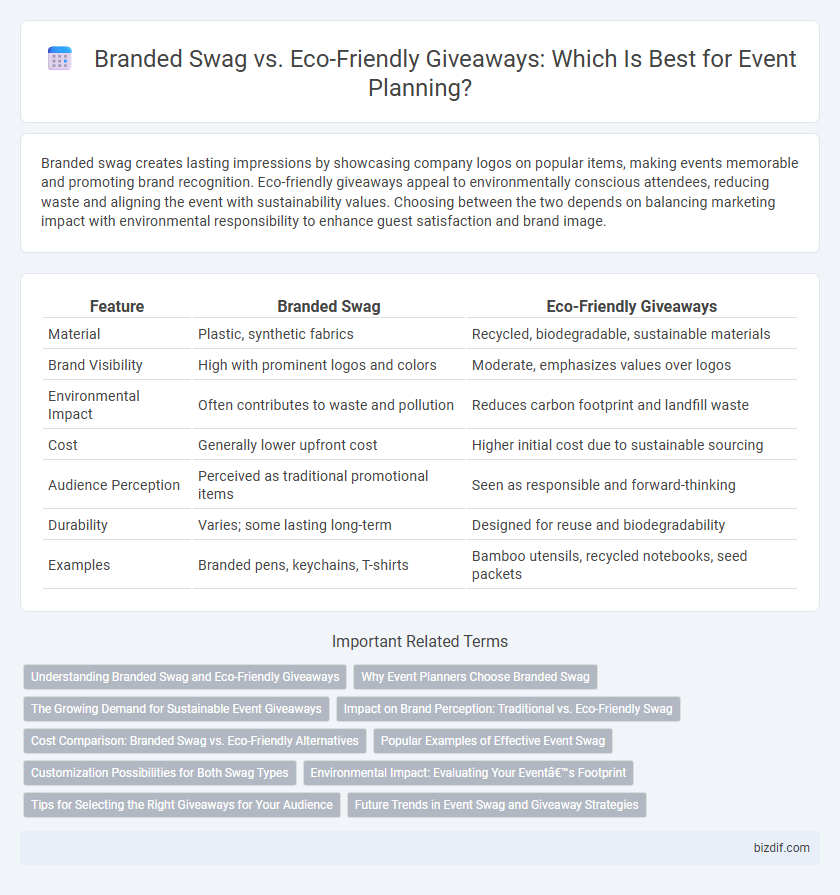Branded swag creates lasting impressions by showcasing company logos on popular items, making events memorable and promoting brand recognition. Eco-friendly giveaways appeal to environmentally conscious attendees, reducing waste and aligning the event with sustainability values. Choosing between the two depends on balancing marketing impact with environmental responsibility to enhance guest satisfaction and brand image.
Table of Comparison
| Feature | Branded Swag | Eco-Friendly Giveaways |
|---|---|---|
| Material | Plastic, synthetic fabrics | Recycled, biodegradable, sustainable materials |
| Brand Visibility | High with prominent logos and colors | Moderate, emphasizes values over logos |
| Environmental Impact | Often contributes to waste and pollution | Reduces carbon footprint and landfill waste |
| Cost | Generally lower upfront cost | Higher initial cost due to sustainable sourcing |
| Audience Perception | Perceived as traditional promotional items | Seen as responsible and forward-thinking |
| Durability | Varies; some lasting long-term | Designed for reuse and biodegradability |
| Examples | Branded pens, keychains, T-shirts | Bamboo utensils, recycled notebooks, seed packets |
Understanding Branded Swag and Eco-Friendly Giveaways
Branded swag consists of customized promotional items featuring company logos or messages designed to increase brand visibility and customer loyalty. Eco-friendly giveaways emphasize sustainable materials and ethical production, aiming to reduce environmental impact while promoting brand values. Understanding the balance between effective marketing and environmental responsibility helps event planners choose swag that resonates with their audience and supports corporate social responsibility goals.
Why Event Planners Choose Branded Swag
Event planners choose branded swag for its powerful ability to increase brand visibility and create lasting impressions among attendees, leveraging custom logos and designs that reinforce brand identity. The tangible, memorable nature of branded items enhances attendee engagement and fosters loyalty, making them effective marketing tools beyond the event itself. Compared to eco-friendly giveaways, branded swag often offers a broader range of customizable options and perceived value, driving better attendee satisfaction and return on investment.
The Growing Demand for Sustainable Event Giveaways
Sustainable event giveaways are increasingly favored over traditional branded swag as event planners and attendees prioritize environmental responsibility. Eco-friendly giveaways such as reusable water bottles, bamboo utensils, and recycled fabric tote bags reduce waste and enhance brand image by aligning with green values. The growing demand for sustainable options reflects a broader shift toward conscious consumerism and corporate social responsibility in event planning.
Impact on Brand Perception: Traditional vs. Eco-Friendly Swag
Branded swag featuring traditional materials like plastic and synthetic fibers often creates a memorable but short-lived brand impression that may be perceived as less socially responsible. Eco-friendly giveaways made from sustainable, biodegradable, or recycled materials enhance brand perception by aligning with growing consumer values on environmental stewardship and ethical business practices. Companies leveraging eco-friendly swag can differentiate themselves in crowded markets, fostering long-term brand loyalty through positive associations with sustainability.
Cost Comparison: Branded Swag vs. Eco-Friendly Alternatives
Branded swag often entails lower upfront costs due to mass production and established supplier networks, making it budget-friendly for large events. Eco-friendly giveaways may have higher initial expenses because of sustainable materials and ethical sourcing but can enhance brand image and appeal to environmentally conscious attendees. Evaluating the total cost of ownership, including potential long-term benefits like customer loyalty and positive environmental impact, is crucial for an informed event planning budget.
Popular Examples of Effective Event Swag
Popular examples of effective event swag include branded reusable water bottles, eco-friendly tote bags made from organic cotton, and bamboo utensils, which resonate well with environmentally conscious attendees. Customized stainless steel straws and biodegradable phone cases also serve as memorable and sustainable giveaways, enhancing brand image while reducing environmental impact. Selecting swag that aligns with green values demonstrates corporate responsibility and boosts engagement by appealing to a growing market segment focused on sustainability.
Customization Possibilities for Both Swag Types
Branded swag offers extensive customization possibilities with vibrant printing techniques, logo embroidery, and a wide range of product types to reinforce brand identity. Eco-friendly giveaways also provide diverse options for personalization, using sustainable materials like bamboo, recycled fabrics, or biodegradable plastics while maintaining visual appeal. Both swag types can be tailored to suit target audience preferences, event themes, and marketing goals, balancing brand exposure with environmental impact.
Environmental Impact: Evaluating Your Event’s Footprint
Branded swag often involves plastic items and synthetic materials that contribute to landfill waste and carbon emissions. Eco-friendly giveaways prioritize sustainable materials like bamboo, recycled paper, and organic fabrics, significantly reducing environmental impact and promoting a greener event footprint. Choosing eco-conscious products aligns with corporate social responsibility goals and resonates positively with environmentally aware attendees.
Tips for Selecting the Right Giveaways for Your Audience
Understanding your audience's values and preferences is crucial when choosing between branded swag and eco-friendly giveaways. Opt for sustainable products like reusable water bottles or seed paper notebooks to appeal to environmentally conscious attendees, while traditional branded items such as custom t-shirts or tech accessories work well for broad brand visibility. Analyzing attendee demographics and event goals ensures the giveaways resonate and enhance brand experience effectively.
Future Trends in Event Swag and Giveaway Strategies
Future trends in event swag emphasize a shift from traditional branded merchandise to eco-friendly giveaways that align with sustainability goals and resonate with environmentally conscious attendees. Incorporating biodegradable materials, reusable items, and products sourced from ethical suppliers enhances brand reputation while reducing ecological impact. Data from recent market analyses indicate a growing preference for personalized, eco-conscious swag, with 68% of event planners prioritizing green giveaways to meet evolving consumer expectations.
Branded swag vs Eco-friendly giveaways Infographic

 bizdif.com
bizdif.com